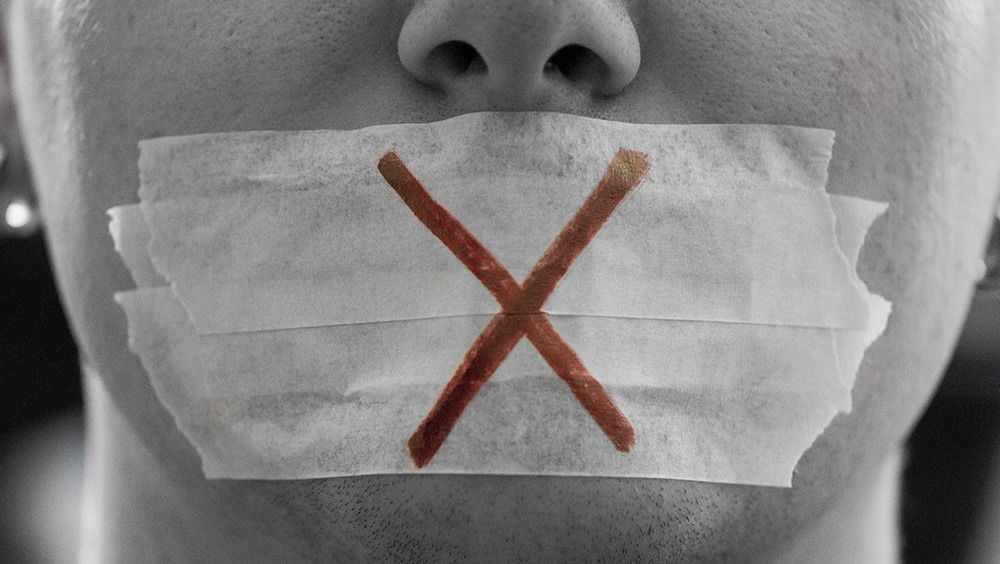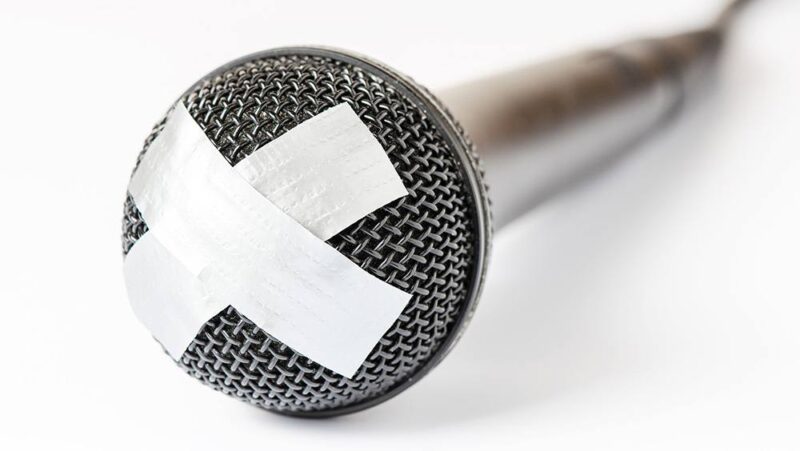What Is a Gag Order? Definition, Examples and More

The First Amendment protects freedom of speech. The Constitution also protects the right to a fair trial – and sometimes publicly sharing information about a trial can interfere with that right. What happens when the rights to free speech and to fair trials come into tension? Sometimes, a judge may issue a gag order.
But what is a gag order, exactly? Why do gag orders exist? How does a judge decide when to issue one? We answer these questions, and much more, below.
What is a gag order?
Most likely we’ve heard the term “gag order” used in connection with high-profile criminal trials.
Formally known as a non-dissemination order, a gag order is a court-imposed restriction on what information during trial or preliminary proceedings can be released to the public and what those involved in the case can say about it. Such orders often apply to everyone directly involved: lawyers, witnesses, defendants and plaintiffs. Sometimes they apply only to specific participants.
Such orders should be of concern anytime they are issued. The public and defendants have a First Amendment right and need to publicly review, critique and comment on the performance of the judicial system. This holds courts accountable and sustains public support for their operations. But that right may run up against the Sixth Amendment right guaranteeing a fair trial.
Let’s look at what gag orders do, and when they may be appropriate limits on free speech.
What is the goal of a gag order?
The Sixth Amendment protects the right to “a speedy and public trial by an impartial jury.” This sometimes aligns with the First Amendment right to access and publish information, including about criminal trials. At other times, the two amendments come into conflict, as too much publicity surrounding a case can create unfairness:
- Potential jurors could be prejudiced by statements in the media or online.
- Witnesses could be threatened or harassed and even pressured to change their testimony.
- Confidential or proprietary trade secrets might be released.
A gag order seeks to prevent public statements that could cause harm to the overall case or people involved that cannot be undone.
RELATED: What is prior restraint?
How does a judge determine if a gag order is needed?
Anyone in a legal proceeding has a First Amendment right to speak and give information publicly. A judge reviewing a gag order will consider:
- Whether there is a compelling interest in silencing trial participants. For example, a judge will consider if there is a credible fear that jurors could be swayed by statements in the media or online, if people involved in the case could be threatened or harassed, or if confidential information could become public.
- Whether a gag order is the best way to achieve that interest – or if other alternatives might have less impact on First Amendment rights than a gag order.
The judge will likely ask:
- Will such an order have related, significant and demonstrable value in achieving its goals? Will it protect participants from intimidation, threat or violence?
- If there is extensive pre-trial news media coverage, will the order prevent further information from reaching potential jurors?
- Will the gag order be effective if applied to the specific person or groups named?
Those last two questions are more complicated to consider than ever, given the ease of sharing on social media information, misinformation or opinion presented as fact.
What other measures can a judge use to ensure a fair trial without imposing a gag order?
Jury selection and trial proceedings can be moved to another area where the local jury pool has not been affected by pre-trial publicity or misinformation.
A judge can create a set of preliminary questions for jurors to root out anyone who already has made up their minds. Lawyers might also be allowed extra questions during the selection process.
During trial, the jury can be sequestered, or ordered to reside during the trial in court-arranged hotel rooms, where court officials can shield jurors from any public comments and news media reports.
What happens if someone violates a court’s gag order?
The trial judge could find that person in contempt of court, which can mean punishment ranging from a fine to a jail term. If a lawyer violates the order, it could also mean disciplinary review and penalties ranging from censure to temporary or permanent loss of their license to practice law.
If the comments or information that violates the order are deemed too damaging to the process of a fair trial, a judge could declare a mistrial.
When a gag order can limit free speech
The First Amendment protects free speech, but this right is not unlimited. The right to a fair trial is also guaranteed by the Constitution, and gag orders are one way to help ensure fair trials. Gag orders are often – rightly – challenged because limits on free speech should not be taken lightly. Gag orders, and punishments for violating, can be appealed to higher courts all the way up to the U.S. Supreme Court. Such orders, as with any limits on First Amendment free speech rights, must be narrow and specific to ensure a fair trial while protecting as much free speech as possible.
Gene Policinski is a senior fellow for the First Amendment at the Freedom Forum. He can be reached at [email protected].
How (and Why) These 16 Famous Songs Were Banned
Related Content
Religion. Speech. Press. Assembly. Petition.
Learn about the First Amendment.

